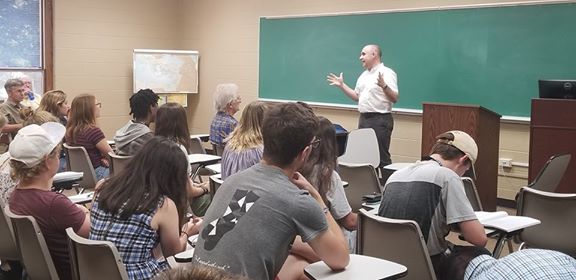Sky News Ireland’s Senior Correspondent, David Blevins, engaged an enrapt audience at Covenant College on October 5 as part of his Media Project Tour across the United States, illuminating a few stories during his experience as a reporter on-the-ground before and after the peace agreement that halted the thirty years of violence in Northern Ireland known as The Troubles.
Reporting anecdotes featured everything from the moment a bomb erupted 100 feet behind Blevins as he covered a Protestant terrorist attack at a Catholic girls’ school, to the journalist’s leap towards Methodist ministry and back again with the guidance of Providence and C.S. Lewis.
During his lecture and a personal interview, Blevins also shed light on the future of Brexit, why Northern Ireland currently lacks a government, and why some fear that a return of violence—or a global economic shutter—could result from disagreement over the Irish border.
“America is in uncharted waters. Europe and the United Kingdom are in uncharted waters. Northern Ireland is in uncharted waters. We have this perfect storm of politics going on around us,” said Blevins.
“The British government has no solution to the border issue between Northern Ireland and the Republic of Ireland, and it’s the biggest stumbling block for a withdrawal agreement [from the European Union] from Prime Minister Theresa May,” he later added. “If there’s no agreement, the UK could crash out of Europe.”
Furthermore, while most Northern Irish residents voted against leaving the EU in the 2016 Brexit Referendum, a UK majority steered the entire kingdom towards Brexit.
Northern Ireland, part of the UK, and the Republic of Ireland, an EU country, share the only territorial border between the UK and the EU. Separation from the EU would usually require a “hard” customs border, in this case across the island of Ireland, for government inspection of goods and people crossing out of the EU and into the UK or vice versa.
According to Blevins, however, “that would be turning back the clock 30 years” for Ireland.
Blevins explained how a physical border has not existed on the island since a peace treaty quelled violence in Northern Ireland between typically Catholic republicans, who wanted to leave the UK to join the Republic of Ireland, and typically Protestant unionists, who wanted to stay in the UK. Over 3,600 people, mostly civilians, were killed from 1968 to 1998 by republican and unionist terrorist groups, Northern Irish security forces, and the British military.
Blevins doubted a “hard border” would spark widespread violence as during The Troubles, but “if there are customs posts on the border, they would become targets for dissident republicans. You may have to bring in police and soldiers to protect them and begin to militarize the border in ways that it hasn’t seen for 20 years—which is devastating.”
Not only could a “hard border” potentially unravel peace in Ireland, it also would stall the 35,000 who cross the border each day to commute for work or transport goods across the island.
Today, the Irish border appears as subtle as the divide between Georgia and Tennessee.
“It’s an enormous issue to keep it as invisible as it is now,” Blevins said. He mentioned that the current roads weave across the border and back again over 275 times. One house even straddles the border with its front door in the UK and its back door in the EU, receiving mail from one country and electricity from another.
May, the EU, and the Irish Prime Minister Leo Varadkar openly oppose hardening the Irish border, but staunch Brexit supporters and the Northern Irish Democratic Unionist Party (DUP) that keeps May in power will settle for nothing less than a clean cut from the EU like the rest of the UK.
“At the moment, I cannot see a solution to the problem,” Blevins said. “They had agreed on a ‘backstop’ (a temporary open border) that was kind of a safety net option if Northern Ireland and the Republic of Ireland would regulate how goods were transferred over the border, but the DUP went a little crazy about that. Now there’s even a row whether Theresa May had or hadn’t agreed to that last Christmas, so the whole thing is just a big mess.”
To make matters worse, the Northern Irish parliament has refused to reassemble since January 2017 due to other disagreements between the DUP and nationalist party Sinn Fein, and the UK may have to impose direct control once again. “People have given up on trying to restore it until we get to the other side of Brexit,” said Blevins.
Some hope that the fallout from Brexit could spark a referendum across the entire island of Ireland for unification between Northern Ireland and the Republic of Ireland.
Unlike what he may have thought five years ago, Blevins believes that now, due to Brexit and the growth of the Irish Catholic minority in Northern Ireland, he may witness a united Ireland in his lifetime. “But I do suppose the Republic could surprise everyone and vote against it,” he added.

